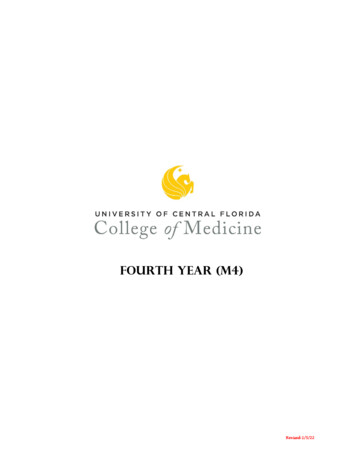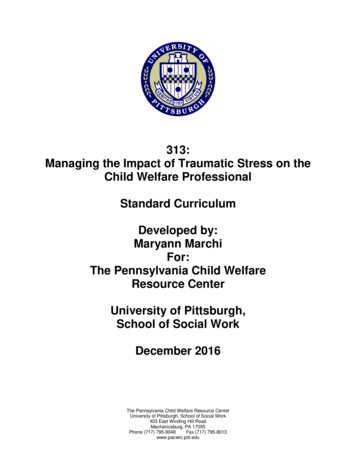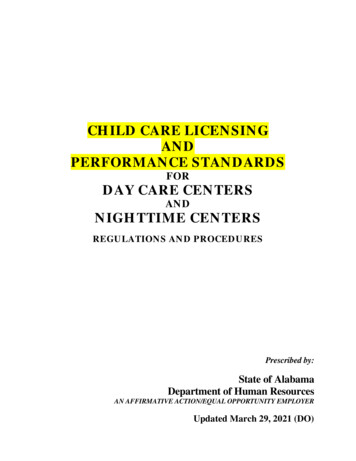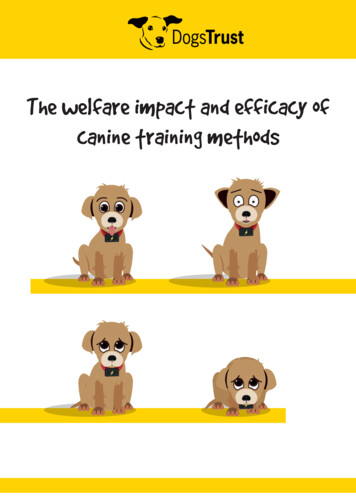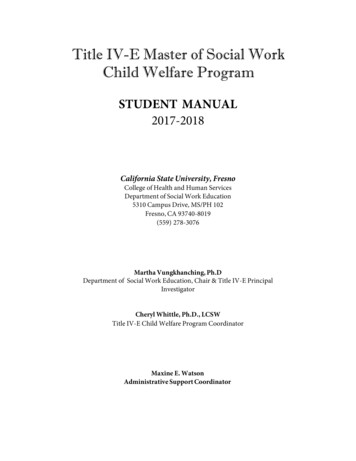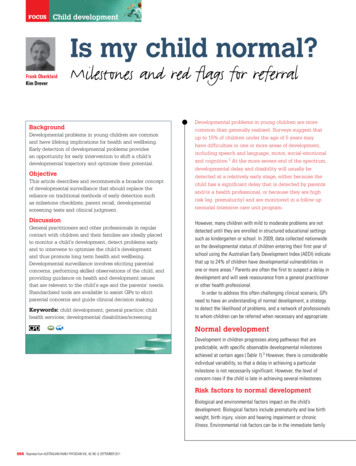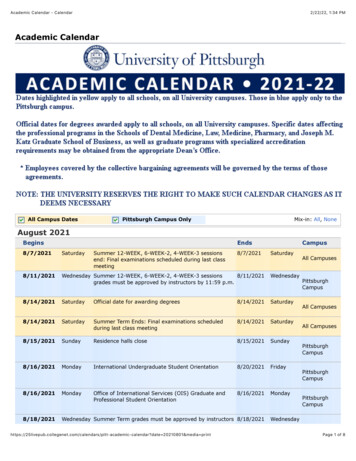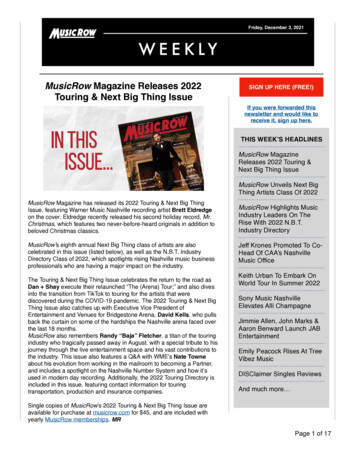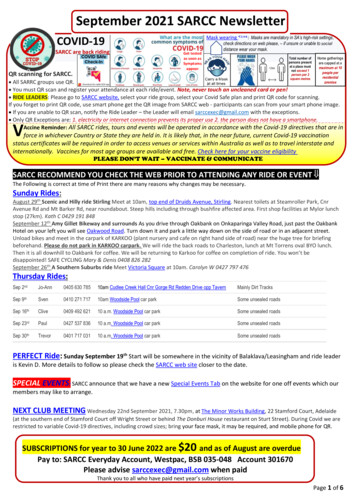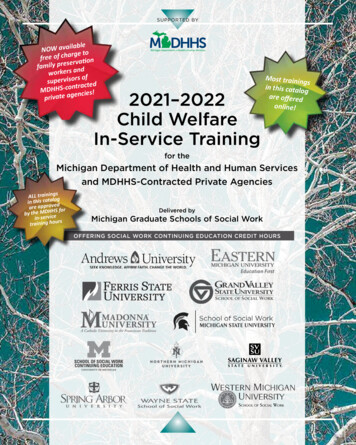
Transcription
SUPPORTED BYableNOW avail toergfree of cha ationvserfamily pre ndrsework a fosupervisors tedcatrnMDHHS-co ncies!eprivate ag2021–2022Child WelfareIn-Service TrainingMost trainingsin this catalogare offeredonline!for theMichigan Department of Health and Human Servicesand MDHHS-Contracted Private AgenciessALL training gin this cataloare approvedforHSby the MDHcein-servistraining hourDelivered byMichigan Graduate Schools of Social WorkOFFERING SOCIAL WORK CONTINUING EDUCATION CREDIT HOURSS chool of S ocial W ork
Contents3Introduction4FAQs5Andrews University6Eastern Michigan University7Ferris State University8Grand Valley State University9Madonna University10–11Michigan State University12Saginaw Valley State University13Spring Arbor University14University of Michigan15Wayne State University16–171819–2223Western Michigan UniversityOn-Demand Training CoursesPreviously recorded live webinars, accessible on-demand onlineoffered by Michigan State UniversityCalendar of TrainingsSchools of Social WorkAndrews UniversityEastern Michigan UniversityFerris State UniversityGrand Valley State UniversityMadonna UniversityMichigan State UniversityNorthern Michigan UniversitySaginaw Valley State UniversitySpring Arbor UniversityUniversity of MichiganWayne State UniversityWestern Michigan University2
IntroductionWorking effectively as a child welfare or family preservationworker or supervisor can be challenging. Keeping familiessafely together, reuniting families, or supporting new lovingfamilies requires a well-trained family preservation andchild welfare workforce. A professional needs to have extensive knowledgeabout child development, family dynamics, culture and community, trauma,evidence-based or promising approaches to helping children and families, andso much more. In addition to knowledge, multiple skills are required to assurechild safety, promote permanency planning, and support the well-being ofchildren and families. Gaining this knowledge and skills requires both initialprofessional education and training as well as an ongoing commitment tolearning and improving. This is important work as child welfare professionalshave the opportunity to save and transform lives by significantly helpingchildren and families.That is why we are pleased topresent this in-service training“Child welfare isn’t rocketcatalog—the product of adynamic partnership among 12science. It is harder.”Michigan schools of social work—David Liederman, former director of thewith MSW programs and theChild Welfare League of AmericaMichigan Department of Healthand Human Services (MDHHS).We appreciate the commitment and support of MDHHS Director ElizabethHertel and her Children’s Services Agency Director Demetrius Starling. Aspecial thanks to training team leaders Stacie Gibson, Laura Schneider, andKimberly Reese for their partnership.Each training is supported by a school of social work. Questions aboutindividual trainings should be directed to the sponsoring school. With thesupport of MDHHS, we are able to offer these sessions free of charge for familypreservation and child welfare workers and supervisors. Multiple humanservice and educational professionals who also serve the families involved withthe child welfare system may find the trainings of interest; many of the trainingtopics will have applicability beyond child welfare practice. Each training is orwill be approved for social work continuing education credit hours.These child welfaretrainings are offeredFREE OF CHARGEfor MDHHS childwelfare and familypreservation workersand supervisors andMDHHS-contractedprivate agencies’child welfare andfamily preservationworkers andsupervisors on aFIRST COME, FIRSTSERVE BASIS.u u u u u uREGISTRATION for eachtraining will close oncethe 35-person capacityhas been reached.If you register and knowin advance you cannotattend, you must contactthe university so yourslot can be offered toanother individual.u u u u u uThis Child Welfare InService Training initiativewas made possiblethrough a grant from theMichigan Departmentof Health and HumanServices.Thank you for your interest and support.Sincerely,Gary R. Anderson, PhD, LMSW, ProfessorKadi M. Prout, LMSW, In-Service Project CoordinatorMSU School of Social Work3
FAQs1As a child welfare worker or supervisor, how many in-service training hours doI need to complete? All public and private child welfare staff are required to complete32 hours of in-service training each calendar year (January through December). This includescaseload carrying and other child welfare staff with specialized and supportive positions to CPS,foster care, and adoption. Additionally, child welfare supervisors are required to obtain 16 hoursof in-service training each fiscal year.2How do I record these in-service training hours to show that I am meeting thisrequirement? Add the training to the Michigan Department of Health and Human Services(MDHHS) Learning Management System (LMS) as external training. Your supervisor will receivean email to approve it to be added to your transcript.3I see that each training in this catalog has a curriculum reference. What doesthis mean? Child welfare and family preservation workers have the opportunity toattend training each year that is based upon a curriculum developed in partnership with theMDHHS Office of Workforce Development and Training and the field. A worker should havethe opportunity to sit down with her/his supervisor regularly to assess which trainings wouldbe most beneficial and most relevant to her/his caseload so that training progress is pre-plannedand helps the worker advance professionally. The LMS website includes a tool called “CreateEmployee Training Plan CWTI” that can assist with this effort.4Do I register to attend the training with the university that is hosting the trainingor through the MDHHS Learning Management System (LMS)? In order to register toattend a training, you should follow the registration instructions found in this catalog. In orderto record your in-service training hours with the MDHHS Office of Workforce Development andTraining, please follow the directions found in FAQ 2.5Is it true, I can attend any in-service training listed in this catalog for FREE?!Yes! The child welfare in-service trainings provided through this collaborative effort areFREE OF CHARGE for child welfare and family preservation workers and supervisors—bothMDHHS and contracted private agencies—on a first come, first serve basis. These trainings areeligible for social work continuing education credit hours, too! Happy training!In addition to the in-person training listed in this catalog,webinars are offered through Michigan State University.See pages 19–22.4
Providing Support to Families Struggling with AddictionCurriculum: Substance abuse: Providing support to families struggling with addictionDate/time: Friday, February 25, 2022 9:00 AM – 12:15 PM (ET)Location: Live synchronous training via ZoomSocial Work CECHs: 3 hours Approval pendingCost: Free to all MDHHS and private agency child welfare workers; 45 all others; 15 for studentsPresenter: Michelle Warren, MA, LPC, CCS, CAADCShannon White, LLPC, CAADCBeginning skill levelTraining objectives: As a result of this training, participants will be prepared to: Understand addiction and the stages of change. Understand how addiction affects family and what that looks like. Increase their ability to provide families with community treatment options.Target audience: Children’s Protective Services Workers Foster Care Workers Adoption Workers Family Preservation WorkersDescription: Substance use disorder (SUD) affects the entire family, from the children to mothers, father, brothers, sister, aunts,and uncles. Substance use affects every family differently, but understanding the basics of addiction is a key component ofassisting families navigating this disease. This training will provide participants with basic information on how addictionaffects the individual, in addition to providing education regarding the stages of changes the individual will experienceduring recovery. Participants will be learn about the effects addiction has on the family as whole and increase theirability to provide families with community treatment options. This training will utilize exercises, small and large groupdiscussions, and visual displays.How to register:Contact:Email:Phone:Website:Go to www.andrews.edu/cas/socialwork/continuingand click on the link provided.Margrethe /socialwork5
Supporting Foster Youth with DisabilitiesCurriculum: Mental and behavioral health: Understanding emotional andmental health concerns of youthDate/time: Friday, October 29, 2021 1:00 PM – 4:15 PM (ET)Location: Live synchronous training via ZoomSocial Work CECHs:Cost:Presenter:3 hoursFree to all MDHHS and private agency child welfare workers; 50 all othersChristina Marsack-Topolewski, PhD, LMSWBeginning skill levelTarget audience: Children’s Protective Services Workers Foster Care Workers Adoption Workers Family Preservation WorkersTraining objectives: As a result of this training, participants will be prepared to: Identify factors to look for in assessing when youth with disabilities are undergoing stress, frustration, or agitation. Recognize and identify the A, B, C (e.g., antecedent, behavior, consequence of the behavior) associated with behavior. Articulate strategies and techniques to provide behavioral support for youth with disabilities in a variety of settings(e.g., school, home, work, social setting).Description: This training will provide a foundation to understand behavior of youth with disabilities. A special focus will beplaced on identifying the function and purpose of behavior and how to best support youth with disabilities. Due to thecomplexity and co-morbid challenges often experienced by youth with disabilities, this training will provide techniquesand strategies that can be employed to effectively anticipate, analyze, and provide solutions to address complex behaviors.Techniques and strategies that will be discussed include: mechanisms to create and employ behavior plans, self-monitoringsystems, and visual schedules. This training will also provide a framework to understand the complex challenges faced byyouth with disabilities and their providers and caregivers who provide regular support. This training will utilize exercises,small and large group discussions, and visual displays.Grandparents as CaregiversCurriculum: Permanency: Techniques to promote attachment and bondingDate/time:Location:Social Work CECHs:Cost:Presenter:Friday, January 14, 2022 9:00 AM – 12:15 PM (ET)Live synchronous training via Zoom3 hoursFree to all MDHHS and private agency child welfare workers; 50 all othersCassandra Barragan, PhD, MSWIntermediate skill levelTarget audience: Children’s Protective Services Workers Foster Care Workers Adoption Workers Family Preservation WorkersTraining objectives: As a result of this training, participants will be prepared to: Recognize challenges and strengths working with grandparents as caregivers. Understand how family dynamics can influence caregiver relationships. Explore their own perspectives on working with grandparents/older adults as caregivers.Description: Grandparents as caregivers can have very different challenges from traditional foster care and guardians withstrengths and benefits unique to their different roles, situations, and family dynamics. Personal and professional perspectivesof grandparents as caregivers and the role of family dynamics will be explored through discussion and reflection. Thistraining will utilize exercises, small and large group discussions, and visual displays.How to register:Supporting Foster Youth with Disabilities: visit https://forms.gle/BQR3KgFSFs6fm5X18How to register:Phone:Email:Grandparents as Caregivers: visit https://forms.gle/EfnoiCziH7YicEy69734-487-4429emu socialworkce@emich.edu6
Higher Education Guidance for YouthCurriculum: Education issues: Navigating higher education with youthDate/time:Location:Social Work CECHs:Cost:Presenter:Tuesday, February 8, 2022 11:00 AM – 2:15 PM (ET)Live synchronous training via Zoom3 hoursFree to all MDHHS and private agency child welfare workers; 50 all othersDave Schrock, MABeginning skill levelTrainingobjectives: As a result of this training, participants Target audience: Children’s Protective Services Workers Foster Care Workers Adoption Workers Family Preservation Workerswill be prepared to:Identify behavioral tendencies to guide higher education path and predict success.Better understand higher education financial resources.Connect youth with academic resources for current and future success.Description: Higher education opportunities are sought after by the majority of high school students and their caregivers inthe hopes of a rewarding career and upward social mobility for good reason. However, helping youth and their caregiversto determine the most viable higher education path based upon interests, goals, and abilities while considering financialrealities can be daunting. Caregivers who have little to no experience themselves in higher education along with youthwho lack an adequate support system prior to and during their experience in higher ed mean that your expert assistanceis crucial in this area. Dave Schrock, MA is a former assistant professor of communication and current professional advisorwho has a unique perspective on what a wide variety of youth need to succeed in a wide variety of higher education paths.This training will utilize exercises, small and large group discussion, and visual displays.How to register:Phone:Email:Website:Contact Kristina is.edu/socialwork7
Supporting and Preserving Michigan FamiliesCurriculum: Family preservation: Supporting and preserving familiesDate/time: Friday, December 10, 2021 8:45 AM – 12:00 PM (ET)Location: Live synchronous training via ZoomSocial Work CECHs:Cost:Presenter:3 hours Approval #MICEC-0004Free to all MDHHS and private agency child welfare workers; 49 all othersLeonica Erwin, LLMSWBeginning skill levelTrainingobjectives: As a result of this training, participants will be prepared to:Discuss the history of family preservation in Michigan.Identify the current impact of Michigan’s family preservation programs.Discuss the future role of family preservation services.Target audience: Children’s Protective Services Workers Foster Care Workers Adoption Workers Family Preservation WorkersDescription: Family preservation is a movement to keep families safely together instead of placing children in foster care orgroup homes. It started out of the recognition that separation from a parent causes significant trauma that can have longterm effects on a child’s life. It is grounded in a strength-based, solution-focused framework that empowers families toincrease resiliency skills during a time of crisis. This training provides an overview of the family preservation movementin Michigan. This training will utilize small and large group discussions and visual displays.Supporting Women of ColorCurriculum: Cultural humility/cultural competence: Cross-cultural knowledgeDate/time: Thursday, January 27, 2022 8:45 AM – 12:00 PM (ET)Location: GVSU Pew Campus, Bicycle Factory201 Front Avenue SW, Grand Rapids, MI 49504Social Work CECHs:Cost:Presenter:3 hours Approval #MICEC-0004Free to all MDHHS and private agency child welfare workers; 49 all othersTakeelia Garrett, M.Ed.Beginning and intermediate skill levelsTrainingobjectives: As a result of this training, participants will Target audience: Children’s Protective Services Workers Foster Care Workers Adoption Workers Family Preservation Workersbe prepared to:Identify an uncomfortable conversation that one may have had with a co-worker/friend/neighbor that wasproductive. What did you learn about yourself from that conversation?Identify at least two ways that you can support women of color in the workplaceIdentify at least one example of how women of color “shift” in each of these spaces: the workplace, school,and/or motherhood.Description: Have you ever had to prepare to go to work? Not to just get dressed but prepare to be a different person than youare at home, with your friends, family, etc. Every day, Black women and women of color have to prepare themselves to goto work in a space that was not created for them. They have to prepare for a world where they have to speak, dress, and actin ways that may not be who they are at home. Based on the book Shifting by Charisse Jones and Kumea Shorter-Gooden,PhD, be prepared to discuss how Black women prepare to face the day as mothers, wives, and breadwinners in a worldthat was not designed for them. These women have to shift in the morning when they leave for work in a White worldand then shift back to Black in the evening when they return home. This training will discuss things we can do to supportthem and conversations that may be uncomfortable but necessary to have. This training will utilize exercises, small andlarge group discussions, and visual displays.How to register:Contact:Email:Visit www.gvsu.edu/swceLucas Treadwellsocialworkce@gvsu.eduPhone:8616-331-7180
Self-care During the COVID PandemicCurriculum: Secondary trauma: Self-care for workersDate/time:Location:Friday, March 4, 2022 Program 9:00 AM – 12:15 PM (ET)Live synchronous training via ZoomSocial Work CECHs: 3 hours Approval pendingCost: Free to all MDHHS and private agency child welfare workers; 15 students; 45 all othersPresenter: Irena Glover, PhD, MSW, LCSWBeginning and intermediate skill levelsTrainingobjectives: As a result of this training, you will be prepared to:Assess the impact of the COVID-19 pandemic on occupational stressors.Explain vicarious trauma and its impact on workers.Discuss at least one approach to self-care.Target audience: Children’s Protective Services Workers Foster Care Workers Adoption Workers Family Preservation WorkersDescription: Child welfare workers encounter several forms of occupational stress on a daily basis, leading to burnout,compassion fatigue, and vicarious trauma, etc. The occupational stressors come from the workers’ job role, the workenvironment, and from the families and children on one’s caseload. The COVID-19 pandemic is a layer of stress thatamplifies these stressors. The pandemic has created greater challenges for engaging with clients, achieving work tasks, andfunctioning in the workplace. A good self-care practice is more essential today than ever before for child welfare workers.A good self-care practice will help child welfare workers thoroughly understand the occupational stressors they faceand be better prepared to manage those stressors successfully. This training provides a self-care practice the through thedevelopment of self-awareness, self-regulation, and self-efficacy. This training will utilize exercises and and visual displays.Psychological Effects of Child Abuse and NeglectCurriculum: Trauma and crisis management: Effects of abuse and neglect on childrenDate/time:Location:Friday, April 15, 2022 Program 9:00 AM – 12:15 PM (ET)Live synchronous training via ZoomSocial Work CECHs: 3 hours Approval pendingCost: Free to all MDHHS and private agency child welfare workers; 15 students; 45 all othersPresenter: Janice King, LMSWBeginning skill levelTrainingobjectives: As a result of this training, you Target audience: Children’s Protective Services Workers Foster Care Workers Adoption Workers Family Preservation Workerswill be prepared to:Identify the psychological symptoms associated with abuse and neglect.Describe common diagnoses found in children experiencing abuse and neglect.Discuss the role evidence-based interventions play in alleviating the effects of abuse and neglect.Description: This training will address the impact of child abuse and neglect as it relates to psychological outcomes:assessing the psychological symptoms related to abuse and neglect; identifying major diagnoses associated with childabuse and neglect; examples of evidence-based practices being used with disorders connected with abuse and neglect;and ways child welfare practitioners can create linkages to mental health services in the community. Also discussed willbe the long-term psychological, behavioral consequences of child abuse and neglect; and the importance of early clinicalintervention as a way to mitigate the long-term effects of child abuse and neglect. This training will utilize exercises andvisual displays.How to register:Contact Dr. Irene Glover, iglover@madonna.edu, 734-432-5569Contact Janice King, jking@madonna.edu, 734-432-55659
Challenging Color-Blind RacismUsing Critical Race Theoryand Liberatory Practice #200-22Curriculum: Cultural humility/cultural competenceDate/time: Thursday, February 17, 2022 Program 9:00 AM – 12:15 PM (ET)Location: Live synchronous training via ZoomSocial Work CECHs: 3 hours Approval MICEC #0001Cost: Free to all MDHHS and private agency child welfare workers;all others check online for pricing, r: Shimon Cohen, MSW, LCSWBeginning skill levelTarget audience: Children’s Protective Services Workers Foster Care Workers Adoption Workers Family Preservation WorkersTraining objectives: As a result of this training, you will be prepared to: Explain race, racial structure, and racial ideology. Describe ways color-blind racism operates. Apply critical race theory (CRT) and liberatory practice frameworks to your work.Description: This training will address color-blind racism using critical race theory and other frameworks to look at how racialcolorblindness is racist and avoids both color/race and power/racism. We will explore frameworks such as critical racetheory and liberatory practice to our work/approach. We will have the opportunity to apply these frameworks using caseexamples. This training will utilize exercises, small and large group discussions, and visual displays.10
Gender Affirming Care for Transgender Youth #201-22Curriculum: Cultural humility/cultural competenceDate/time:Location:Wednesday, February 23, 2022 Program 9:00 AM – 12:15 PM (ET)Live synchronous training via ZoomSocial Work CECHs: 3 hours Approval MICEC #0001Cost: Free to all MDHHS and private agency child welfare workers;all others check online for pricing, rs: Susan Radzilowski, MSW, LMSW, ACSWBeginning skill levelTarget audience: Children’s Protective Services Workers Foster Care Workers Adoption Workers Family Preservation WorkersTraining objectives: As a result of this training, you will be prepared to: Be aware of three risk factors impacting transgender children and adolescents at home, school, and in the community. Identity three protective factors that positively impact outcomes for transgender clients. Identify three intervention strategies used to support the mental health of children and teens who identify as TGNC. Utilize three strategies to assist parents (including foster parents and adoptive parents) to support their children intheir authentic gender identity.Description: This training will address a working definition of terms including: Transgender, Gender Identity, GenderExpression, Intersex, Gender Nonconforming, Non-binary, Intersex, and Gender Transition. Language and terminologywill be examined, with emphasis on using affirming language and avoiding offensive terminology. The trainingwill examine risk factors and protective factors that impact transgender youth from a solution-focused lens. Familyrelationship dynamics will be explored with attention paid to foster and adoptive families as well as birth families.Strategies to increase parent support will be explored, with an emphasis on increasing parental capacity to support thetransgender youth. Specific concerns that apply to transgender and gender nonconforming (TGNC) children younger thanage 13 will be addressed. The training will also provide a brief overview of gender transition process: legal, social, andmedical. This training will utilize exercises, small and large group discussions, and visual displays.How to register for in-person training:Contact:Phone:Email:Online at https://socialwork.msu.edu/ceu/catalog.phpGina Tremonti Gembel, MSW517-353-3060swkce@msu.eduMichigan State University School of Social Work, an accredited social work education program, is authorized by theMichigan Licensure Law Administrative Rule 338.2965 to award Michigan social work continuing education contacthours. We are also an approved Michigan Social Work Continuing Education Collaborative Provider (provider#0001) for all programs through August 2022, renewed annually.11
Culturally Informed Practice with LGBTQIA YouthCurriculum: Cultural humility/cultural competence: Supporting LGBTQ youthDate/time:Location:Wednesday, January 19, 2022 Program 1:00 PM – 4:15 PM (ET)Live synchronous training via ZoomSocial Work CECHs: 3 hours Approval MICEC #0001Cost: Free to all MDHHS and private agency child welfare workers;all others check online for pricing, r: Lucy Mercier, PhD, LMSW, ACSWBeginning skill levelTrainingobjectives: As a result of this training, you Target audience: Children’s Protective Services Workers Foster Care Workers Adoption Workers Family Preservation Workerswill be prepared to:Understand emerging cultures and apply concepts of sex, gender, gender expression to youth who identify asmembers of LGBTQIA communities. Consider practices that enhance engagement, assessment, and intervention with LGBTQIA youth. Identify agency practices that affirm and support LGBTQIA youth culture .Description: This training will provide an overview of LGBTQIA youth, with an emphasis on knowledge needed forculturally informed practice with these clients and their families. Individual and agency practices that affirm and supportthese clients will be identified and described. Participants will have the opportunity to develop a remediation plan forcurrent practices that block adequate care for LGBTQIA clients. This training will utilize exercises, small and large groupdiscussions, and visual displays.Crisis and Suicide Intervention for Foster CareCurriculum: Mental and behavioral health: Suicide prevention and how to coach foster parents on prevention strategiesDate/time:Location:Thursday, February 10, 2022 Program 1:00 PM – 4:15 PM (ET)Live synchronous training via ZoomSocial Work CECHs: 3 hours Approval MICEC #0001Cost: Free to all MDHHS and private agency child welfare workers;all others check online for pricing, rs: Lucy Mercier, PhD, LMSW, ACSWIntermediate skill levelTrainingobjectives: As a result of this training, you Target audience: Children’s Protective Services Workers Foster Care Workers Adoption Workers Family Preservation Workerswill be prepared to:Identify the fundamental aspects of crisis and apply them to suicidal risk in foster children.Understand emotional and cognitive blocks to intervening with children at risk for suicide.Teach caregivers a simple model of crisis/suicide intervention.Description: This training will provide an overview of crisis and suicide intervention with an emphasis on knowledgeneeded for training foster families to apply a simple model of intervention with youth in their care. Participants willexplore common blocks for addressing suicidality in youth and learn how to use exploration, assessment, and shortterm intervention strategies that reduce suicide risk. A simple, teachable model for intervention will be provided forparticipants to share with caregivers. This training will utilize exercises, small and large group discussions, and visualdisplays.How to register:Send email with name, email, course name and date toLucy Mercier at mercier@svsu.edu12
Motivating the Hurt, Broken, and Challenging:Guiding and Connecting Biological Parents withMental Health Services in Their CommunityCurriculum: Mental and behavioral health: Working with parents coping with mental illnessDate/time:Location:Social Work CECHs:Cost:Presenter:Wednesday, November 17, 2021 Program 1:00 PM – 4:15 PM (ET)Live synchronous training via Zoom3 hours Approval pendingFree to all MDHHS and private agency child welfare workers; 65 all othersNich Pollak, LMSWBeginning and intermediate skill levelsTarget audience: Children’s Protective Services Workers Foster Care Workers Family Preservation WorkersTraining objectives: As a result of this training, participants will be prepared to: Understand mental health services in their community and how to connect families. Learn skills to validate and elicit motivation from biological parents who are resistant. Set obtainable goals for biological families with severe mental health challenges.Description: This training is geared toward foster care workers working with biological parents resistant to receiving mentalhealth supports. Nich Pollak is a licensed clinical social worker with 18 years working with families and mental healthsupports. Participants will learn about available mental health services and how to connect biological parents, skills tovalidate and elicit motivation when parents are resistant and how to set obtainable goals for families with severe mentalhealth challenges. This training will utilize role playing, small and large group discussions, and visual displays.Human Trafficking: Moving from Awareness to ActionCurriculum: Trauma and crisis management: Human traffickingDate/time: Friday, January 21, 2022 Program 9:00 AM – 12:15 PM (ET)Location: Live synchronous training via ZoomSocial Work CECHs: 3 hours Approval pendingCost: Free to all MDHHS and private agency child welfare
Wayne State University Western Michigan University 2 Contents 3 Introduction 4 FAQs 5 Andrews University 6 Eastern Michigan University 7 Ferris State University 8 Grand Valley State University 9 Madonna University 10–11 Michigan State University 12 Saginaw Valley State University 13 Spring Arbor University 14 Univ
